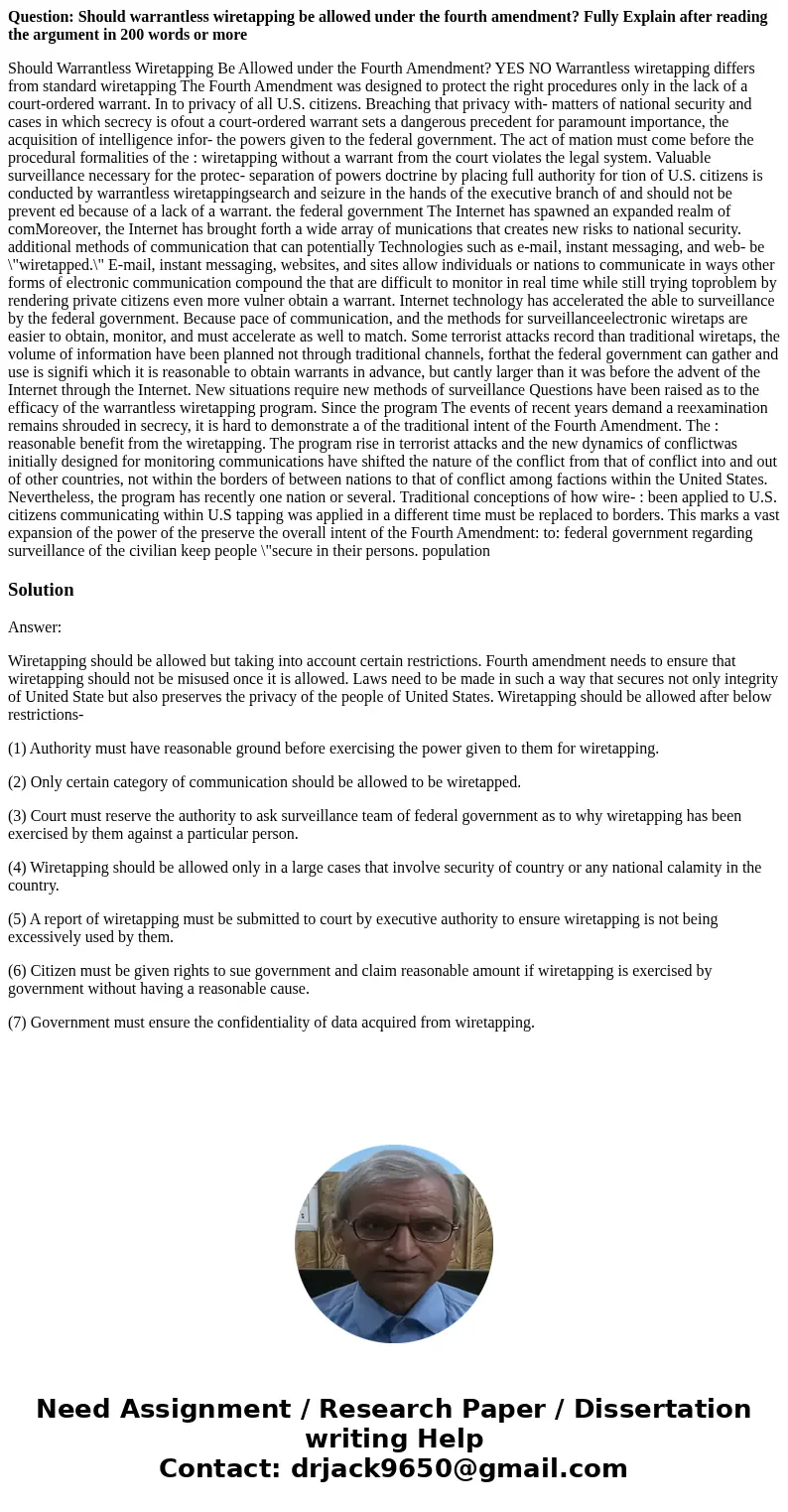Question Should warrantless wiretapping be allowed under the
Question: Should warrantless wiretapping be allowed under the fourth amendment? Fully Explain after reading the argument in 200 words or more
Should Warrantless Wiretapping Be Allowed under the Fourth Amendment? YES NO Warrantless wiretapping differs from standard wiretapping The Fourth Amendment was designed to protect the right procedures only in the lack of a court-ordered warrant. In to privacy of all U.S. citizens. Breaching that privacy with- matters of national security and cases in which secrecy is ofout a court-ordered warrant sets a dangerous precedent for paramount importance, the acquisition of intelligence infor- the powers given to the federal government. The act of mation must come before the procedural formalities of the : wiretapping without a warrant from the court violates the legal system. Valuable surveillance necessary for the protec- separation of powers doctrine by placing full authority for tion of U.S. citizens is conducted by warrantless wiretappingsearch and seizure in the hands of the executive branch of and should not be prevent ed because of a lack of a warrant. the federal government The Internet has spawned an expanded realm of comMoreover, the Internet has brought forth a wide array of munications that creates new risks to national security. additional methods of communication that can potentially Technologies such as e-mail, instant messaging, and web- be \"wiretapped.\" E-mail, instant messaging, websites, and sites allow individuals or nations to communicate in ways other forms of electronic communication compound the that are difficult to monitor in real time while still trying toproblem by rendering private citizens even more vulner obtain a warrant. Internet technology has accelerated the able to surveillance by the federal government. Because pace of communication, and the methods for surveillanceelectronic wiretaps are easier to obtain, monitor, and must accelerate as well to match. Some terrorist attacks record than traditional wiretaps, the volume of information have been planned not through traditional channels, forthat the federal government can gather and use is signifi which it is reasonable to obtain warrants in advance, but cantly larger than it was before the advent of the Internet through the Internet. New situations require new methods of surveillance Questions have been raised as to the efficacy of the warrantless wiretapping program. Since the program The events of recent years demand a reexamination remains shrouded in secrecy, it is hard to demonstrate a of the traditional intent of the Fourth Amendment. The : reasonable benefit from the wiretapping. The program rise in terrorist attacks and the new dynamics of conflictwas initially designed for monitoring communications have shifted the nature of the conflict from that of conflict into and out of other countries, not within the borders of between nations to that of conflict among factions within the United States. Nevertheless, the program has recently one nation or several. Traditional conceptions of how wire- : been applied to U.S. citizens communicating within U.S tapping was applied in a different time must be replaced to borders. This marks a vast expansion of the power of the preserve the overall intent of the Fourth Amendment: to: federal government regarding surveillance of the civilian keep people \"secure in their persons. populationSolution
Answer:
Wiretapping should be allowed but taking into account certain restrictions. Fourth amendment needs to ensure that wiretapping should not be misused once it is allowed. Laws need to be made in such a way that secures not only integrity of United State but also preserves the privacy of the people of United States. Wiretapping should be allowed after below restrictions-
(1) Authority must have reasonable ground before exercising the power given to them for wiretapping.
(2) Only certain category of communication should be allowed to be wiretapped.
(3) Court must reserve the authority to ask surveillance team of federal government as to why wiretapping has been exercised by them against a particular person.
(4) Wiretapping should be allowed only in a large cases that involve security of country or any national calamity in the country.
(5) A report of wiretapping must be submitted to court by executive authority to ensure wiretapping is not being excessively used by them.
(6) Citizen must be given rights to sue government and claim reasonable amount if wiretapping is exercised by government without having a reasonable cause.
(7) Government must ensure the confidentiality of data acquired from wiretapping.

 Homework Sourse
Homework Sourse